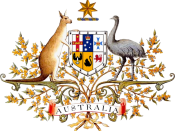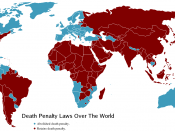When travel, trade and communication between countries becomes uncomplicated, international crime raises. Governments can only pass laws that control behaviour within their jurisdiction. For example, the government of New South Wales can only make laws that apply within the state.
An Australian who commits a crime in another country go by the laws of that country and not Australia's laws. If a person was caught smuggling drugs into Indonesia, they would most likely face the death-penalty. In Australia, since the death penalty has been abolished, the drug-smuggler would be put in prison or a detention centre. In rare cases, it is possible for an Australian citizen to be held responsible by Australian authorities for a crime that was performed outside the country. This has been put into effect by the Commonwealth in relation to war crimes committed during the Second World War. The Commonwealth also has power to pass laws that do not allow Australia from doing certain things while in other jurisdictions.
Transnational crimes are those that break the laws in more than one country. Usually, it is hard to achieve anything due to the differences in laws in each country.
Crimes against international law are those that break international agreements and are prosecuted by the United Nations, for example piracy, crimes against peace, slavery, torture, crimes of aggression, apartheid and crimes of aggression .
Some international crimes, such as slavery, are condemned regularly by the international community. Most other international crimes are created through treaties. A treaty is a formal agreement between independent states or organisation of states. Treaties only apply to nations that agreed to it. For example, torture is an international crime but the law can only be imposed in those nations that have signed treaties which do not tolerate torture.
The two types of...


